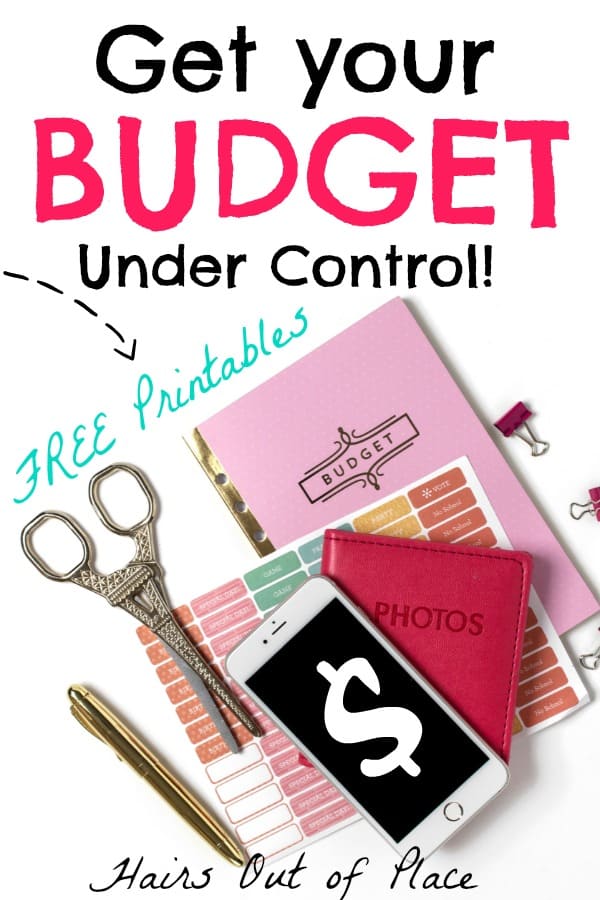Keeping track of your money and spending is one of those necessary adult evils in life we just have to do to make sure we aren't spending more than we're making.
?Maybe it feels like there should be more left over at the end of the month, and there just...isnt?
?Or maybe you need help with your finances to pay off debt or save for something really important to you?
?Or maybe you're even spending more than you're making and don't know how to change that?
Getting your spending in check NOW, will keep you out of the nasty cycle of not having enough money to pay your bills, having to put extra expenses on a high-interest rate credit card or accidentally bouncing checks.
What typically happens is we start by just checking our bank account balance on a phone app, and that might work for a while, until:
?More adulting responsibilities kick in and you start having more bills to track than you can keep straight
?A bill is due you can't fully pay for, and you're wondering where your money went
?You want to save for something awesome like a vacation next year or want to start a family soon, but you're always out of money at the end of the month
While starting and using a budget seems like a necessary and evil part of adult life, once you get in the habit of using one, your money stress will start to go away, your financial goals start to get met and you feel accomplished for working hard to pay for that awesome trip or finally being able to put money in your work 401k.
After my hubs and I got married and had a baby one year later, dropping down to one tight income required us to start using a budget. We made it a priority to have a weekly 15-minute budget chat every Sunday night just to make sure we'd stay on track.
Whether you're single and making a budget for the first time, a college student or you have family expenses too, our budgeting info will work for you too.
The benefits of using a budget
Trust me, it's so worth it and once you get used to keeping track of your spending, I can almost guarantee that:
? Your expenses will go down
? Your savings will go up
? You'll feel less stressed having your finances finally under control
? Creating a monthly budget will get easy and become second nature!
What's in a Budget?
Your Income
Your Expenses
Net Income (how much money is left over after paying expenses)
Money/Savings Goals (nice to remind yourself why you're doing this!)
Make sure to download our free budget printables to make reading and understanding this post even easier! There's a simple family budget version with common budget categories already filled out and there's a simple blank budget for you to fill in your own categories.
I'm a notebook and journal kind of girl and love cute printables to organize our life in a home and money binder!
To Get Started
When you're ready to start your budget, you'll need the following:
✔️Paychecks
✔️Info on any other income sources (like PayPal account info, bank statements, etc)
✔️Statements for all of your regular monthly bills you need to live/function (housing, utilities, gas, car payment, food)
✔️A list of Discretionary expenses- meaning the expenses that varies from month to month and you have some control over what that expense is going to be (hair appointment, gym costs, eating out, etc). These are expenses that aren't required to survive, but that you still have.
How A Budget Works
When you set up a budget for the first time, you're making an estimate of your monthly income sources and expenses for each month and then at the end of the month, you're writing in how much you actually received and/or spent for each item on your budget.
Being able to compare, for instance, what a bill should be, versus what you ended up spending is SO helpful in teaching us what we have to cut back on and also can help us see we're on track for reaching our monthly money goals!
Many of your expenses should be the same each month, if a bill varies from month to month like groceries, look back at what you spent the last three months and take the average or use the month you feel best represents your typical monthly grocery expenses.
WHAT YOU'RE EARNING
To get started with figuring out the income portion of your budget, you'll need to get together any paystubs for the month for you and your spouse/partner (if you have one) and any other sources of income you might have.
Extra income sources could be something like:
- part-time side hustle income - a weekend waitress job, dog walking, completing surveys, etc.
- hobby income - playing in a band or selling your crafty stuff on Etsy
- interest earned from savings
- Or cash back from using a shopping app like Ebates or other rewards programs
I usually put my regular income and side hustle sources down for our budget and always include a miscellaneous line item to catch irregular income we don't receive every month.
For example:
Your paycheck- $4000/mo
Your part-time blog- $1000/mo
Interest from savings - $20
Ebates rewards - $50
Then add that up: $4000 + $1000 + $20 + $50 = $5,070. Both the savings and Ebates earnings could get added to MISC if they aren't regular earnings.
WHAT YOU'RE SPENDING
To calculate your monthly expenses and figure out what you're spending, you'll need to gather up your monthly statements, pull out those receipts in your wallet, or have your cell phone handy so you can look at your account deductions on your bank phone app.
There's different types of expenses: the ones that are fixed and you have them every single month whether you want them or not like housing or a student loan payment or that are essential to survival like groceries and utilities. And then there are the non-essential expenses like eating out, gym costs or buying clothes.
Finding how much you spend on set monthly fixed expenses is easier since that information is on your most recent bill statement or on your bank statement. To figure out how much you spend per month on your expenses that vary like groceries, we suggest adding up all your expenses for that category for the past 2-3 months and taking the average
Fixed Expenses
These are your bills that you simply just have to pay on time and are critical, they are regular monthly bills that might be a set amount every month like your rent/mortgage, student loan bill, or a car payment.
You also have essential bills every month that are fixed monthly expenses like groceries, utilities or gas, but that vary from month to month. These are still really important, but there might be opportunities to cut back on these to help you reach your money goals.
Non Essential Expenses
Non-essential expenses are the fun extras that aren't critical but are nice to have. These are things you could drop if you HAD to like clothing costs, getting your nails done, eating out, or entertainment.
I personally think no matter how tight someone's budget is, it's important to still find ways to pay for at least a couple fun extras in life. So don't worry, we aren't going to tell you to drop all the fun in your life now that you're creating a budget 😉 Even when we were on a low income living off of just my husband's salary, we still found savvy ways to come up with extra money to pay for a couple fun extras.
Here's a simple example of what a list of budget expenses might look like:
Rent/mortgage $1000
Heat $40
Water $30
Student Loan $125
Groceries $300
Gas $60
Entertainment $200
You'll want to write all of your expenses down for the month, wether they're fixed monthly bills or non-essential discretionary spending.
WHAT ARE YOUR SAVINGS GOALS?
Figuring out your money goals is a critical part of your monthly budget. Most of us aren't in the situation to just pay for college in full each year or inherit $2 million you can use for retirement.
Maybe you're money goals are:
✔️To pay off your student loan debt
✔️To start putting money in your work's retirement 401k
✔️To start saving for your first home
✔️To work towards having $5K in your savings account
Even if you aren't spending more than you're making, living pay check to pay check sucks if you aren't figuring out how to pay for your future and save for the money goals that you have. Getting out of that living paycheck to paycheck cycle is so freeing and rewarding!
When we were living on a super tight income after I became a SAHM, we still made it a priority to save for retirement, save money for the kids college, and put money into savings every month. Was it the full amount we were "supposed" to pay every month? Definitely not. But saving a little every month is a good place to start and will help you make it a habit to work towards certain financial goals.
Over time as your income increases and you find savvy ways to cut extra expenses, you can increase the amount you're putting towards your savings goals.
Prioritizing your savings goals is SO IMPORTANT! After making sure our fixed expenses are covered, we prioritize our savings goals BEFORE our non-essential expenses.
One tip that has always helped us with saving is by setting up an auto-transfer from our checking account to savings, so that we aren't tempted to skip transferring money to savings one month so we can go buy concert tickets instead.
Prioritizing yourself and paying yourself first is one of the keys to reaching your financial goals! ??
PUTTING IT ALL TOGETHER
Now that you have all of your income sources written down and know what both your fixed expenses and non-essential expenses are, you can put all this info together in your budget worksheet. Don't forget to download it now if you haven't done it yet! There's additional budgeting tips and help that's just included with the worksheet!
We've included a detailed family budget for someone who has many monthly expenses and we've also included a blank template so you can fill in your OWN custom income and expense details.
To keep track of your budget each month, you enter what you're budgeting per month in the BUDGET column and then what you actually sent in the ACTUAL column.
If you take your income and subtract your expenses, a positive number tells you that you're doing an amazing job and you earned more money than you spent.
If you subtract your expenses from your income and you have a negative number, this means you're spending more money than you're making! If this is the case, you'll want to make sure and cut back on non-essential expenses the next month.
If you broke even, as long as you included your savings goals in your budget, that's good too! It's always great to have a little wiggle room in your budget and extra money in savings, so we'd still suggest looking to see what you can cut back on to at least help you cover unexpected future expenses.
MONITOR & ADJUST
Adjust your spending
Now's time time to make a plan for success, my friend! You have your budget, you now know if you're keeping your income above your expenses or at least breaking even.
With all of this critical info written down, now is the perfect time to make spending adjustments and figure out how you can cut back on unnecessary expenses.
Finding out you spent $400 on clothes last month when you had in your head it was only $100, is a huge benefit of writing down what you spend. There's so many little expenses we honestly forget we made by the time a whole month goes by.
Or by realizing you spend $120 per month on lattes, might make you want to make coffee from home or just wait until you get to work so you can get it for free.
Monitor
So what's the point of getting all of this budgeting stuff figured out if you don't stick with it? That's where monitoring your progress comes in and why it's so important to do regular budget check-ins. It takes about 8 weeks for a new habit to become second nature, so this will take commitment on your part for the next couple months until budgeting becomes a habit.
Having a budget check-in sounds pretty unsexy to be honest, but again, making it a weekly habit to see where you're at is the best way to make sure you don't overspend by months ends. There's no reason you can't try to make budget check-in night a little more fun by adding a bottle of wine and upbeat music.
Having a weekly check-in is also important if you have a significant other. Maybe you've set aside $50 per week for eating out, but then found out you each spent $40. This is why it's critical to get on the same page as your partner and make sure you know where you're at financially from week to week.
OTHER BUDGETING OPTIONS
Finding a budget that works for you is super critical to budgeting success. What works best for one person might not work best for someone else! Here's a handful of recommended budgeting options to make creating a budget easy for you:
A budget printable
Create an excel spreadsheet
Use a simple phone app like mint.com
Use an app like Personal Capital if you also have investments you want to track
Buy a budgeting program like Quicken to have on your computer
OTHER RESOURCES
If after completing your budget you realize you either need to cut back on your expenses but need help OR you want to find extra ways to make extra money to help you reach your savings goals, here's some additional resources for you:
8 Ways to Make an Extra $300 Each Month With Your Smartphone
How We Make an Extra $2500/mo with Our Part-time Blog (in under one year!)
15 Part-time Side Hustles To Help You Make Over $1000/mo
10 Frugal Living Tips When You're on a Tight Budget








Leave a Reply